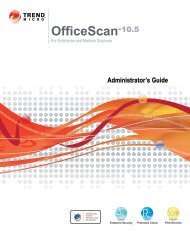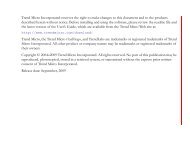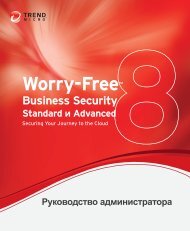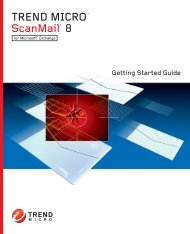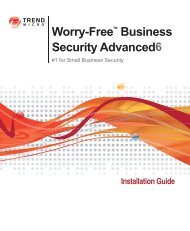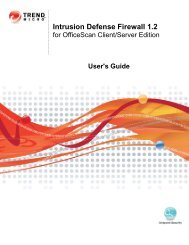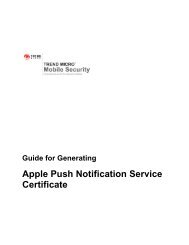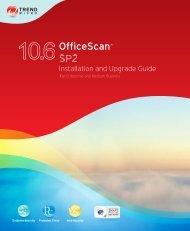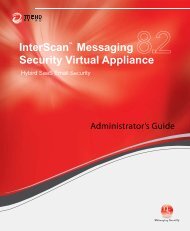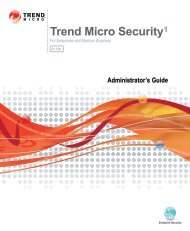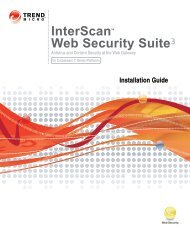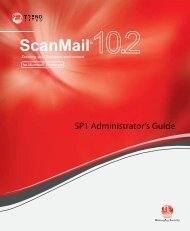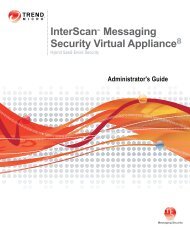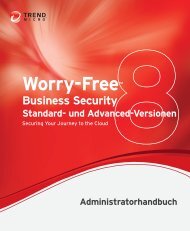- Page 1:
TM OfficeScan 10 For Enterprise and
- Page 4 and 5:
The user documentation for Trend Mi
- Page 6 and 7:
Trend Micro OfficeScan 10 Service P
- Page 8 and 9:
Trend Micro OfficeScan 10 Service P
- Page 10 and 11:
Trend Micro OfficeScan 10 Service P
- Page 12 and 13:
Trend Micro OfficeScan 10 Service P
- Page 14 and 15:
Trend Micro OfficeScan 10 Service P
- Page 16 and 17:
Trend Micro OfficeScan 10 Service P
- Page 18 and 19:
Trend Micro OfficeScan 10 Service P
- Page 20 and 21:
Trend Micro OfficeScan 10 Service P
- Page 22 and 23:
Trend Micro OfficeScan 10 Service P
- Page 24 and 25:
Trend Micro OfficeScan 10 Service P
- Page 26 and 27:
Trend Micro OfficeScan 10 Service P
- Page 28 and 29:
Trend Micro OfficeScan 10 Service P
- Page 30 and 31:
Trend Micro OfficeScan 10 Service P
- Page 32 and 33:
Trend Micro OfficeScan 10 Service P
- Page 34 and 35:
Trend Micro OfficeScan 10 Service P
- Page 36 and 37:
Trend Micro OfficeScan 10 Service P
- Page 38 and 39:
Trend Micro OfficeScan 10 Service P
- Page 40 and 41:
Trend Micro OfficeScan 10 Service P
- Page 42 and 43:
Trend Micro OfficeScan 10 Service P
- Page 44 and 45:
Trend Micro OfficeScan 10 Service P
- Page 46 and 47:
Trend Micro OfficeScan 10 Service P
- Page 48 and 49:
Trend Micro OfficeScan 10 Service P
- Page 50 and 51:
Trend Micro OfficeScan 10 Service P
- Page 52 and 53:
Trend Micro OfficeScan 10 Service P
- Page 54 and 55:
Trend Micro OfficeScan 10 Service P
- Page 56 and 57:
Trend Micro OfficeScan 10 Service P
- Page 58 and 59:
Trend Micro OfficeScan 10 Service P
- Page 60 and 61:
Trend Micro OfficeScan 10 Service P
- Page 62 and 63:
Trend Micro OfficeScan 10 Service P
- Page 64 and 65:
Trend Micro OfficeScan 10 Service P
- Page 66 and 67:
Trend Micro OfficeScan 10 Service P
- Page 68 and 69:
Trend Micro OfficeScan 10 Service P
- Page 70 and 71:
Trend Micro OfficeScan 10 Service P
- Page 72 and 73:
Trend Micro OfficeScan 10 Service P
- Page 74 and 75:
Trend Micro OfficeScan 10 Service P
- Page 76 and 77:
Trend Micro OfficeScan 10 Service P
- Page 78 and 79:
Trend Micro OfficeScan 10 Service P
- Page 80 and 81:
Trend Micro OfficeScan 10 Service P
- Page 82 and 83:
Trend Micro OfficeScan 10 Service P
- Page 84 and 85:
Trend Micro OfficeScan 10 Service P
- Page 86 and 87:
Trend Micro OfficeScan 10 Service P
- Page 88 and 89:
Trend Micro OfficeScan 10 Service P
- Page 90 and 91:
Trend Micro OfficeScan 10 Service P
- Page 92 and 93:
Trend Micro OfficeScan 10 Service P
- Page 94 and 95:
Trend Micro OfficeScan 10 Service P
- Page 96 and 97:
Trend Micro OfficeScan 10 Service P
- Page 98 and 99:
Trend Micro OfficeScan 10 Service P
- Page 100 and 101:
Trend Micro OfficeScan 10 Service P
- Page 102 and 103:
Trend Micro OfficeScan 10 Service P
- Page 104 and 105:
Trend Micro OfficeScan 10 Service P
- Page 106 and 107:
Trend Micro OfficeScan 10 Service P
- Page 108 and 109:
Trend Micro OfficeScan 10 Service P
- Page 110 and 111:
Trend Micro OfficeScan 10 Service P
- Page 112 and 113:
Trend Micro OfficeScan 10 Service P
- Page 114 and 115:
Trend Micro OfficeScan 10 Service P
- Page 116 and 117:
Trend Micro OfficeScan 10 Service P
- Page 118 and 119:
Trend Micro OfficeScan 10 Service P
- Page 120 and 121:
Trend Micro OfficeScan 10 Service P
- Page 122 and 123:
Trend Micro OfficeScan 10 Service P
- Page 124 and 125:
Trend Micro OfficeScan 10 Service P
- Page 126 and 127:
Trend Micro OfficeScan 10 Service P
- Page 128 and 129:
Trend Micro OfficeScan 10 Service P
- Page 130 and 131:
Trend Micro OfficeScan 10 Service P
- Page 132 and 133:
Trend Micro OfficeScan 10 Service P
- Page 134 and 135:
Trend Micro OfficeScan 10 Service P
- Page 136 and 137:
Trend Micro OfficeScan 10 Service P
- Page 138 and 139:
Trend Micro OfficeScan 10 Service P
- Page 140 and 141:
Trend Micro OfficeScan 10 Service P
- Page 142 and 143:
Trend Micro OfficeScan 10 Service P
- Page 144 and 145:
Trend Micro OfficeScan 10 Service P
- Page 146 and 147:
Trend Micro OfficeScan 10 Service P
- Page 148 and 149:
Trend Micro OfficeScan 10 Service P
- Page 150 and 151:
Trend Micro OfficeScan 10 Service P
- Page 152 and 153:
Trend Micro OfficeScan 10 Service P
- Page 154 and 155:
Trend Micro OfficeScan 10 Service P
- Page 156 and 157:
Trend Micro OfficeScan 10 Service P
- Page 158 and 159:
Trend Micro OfficeScan 10 Service P
- Page 160 and 161:
Trend Micro OfficeScan 10 Service P
- Page 162 and 163:
Trend Micro OfficeScan 10 Service P
- Page 164 and 165:
Trend Micro OfficeScan 10 Service P
- Page 166 and 167:
Trend Micro OfficeScan 10 Service P
- Page 168 and 169:
Trend Micro OfficeScan 10 Service P
- Page 170 and 171:
Trend Micro OfficeScan 10 Service P
- Page 172 and 173:
Trend Micro OfficeScan 10 Service P
- Page 174 and 175:
Trend Micro OfficeScan 10 Service P
- Page 176 and 177:
Trend Micro OfficeScan 10 Service P
- Page 178 and 179:
Trend Micro OfficeScan 10 Service P
- Page 180 and 181:
Trend Micro OfficeScan 10 Service P
- Page 182 and 183:
Trend Micro OfficeScan 10 Service P
- Page 184 and 185:
Trend Micro OfficeScan 10 Service P
- Page 186 and 187:
Trend Micro OfficeScan 10 Service P
- Page 188 and 189:
Trend Micro OfficeScan 10 Service P
- Page 190 and 191:
Trend Micro OfficeScan 10 Service P
- Page 192 and 193:
Trend Micro OfficeScan 10 Service P
- Page 194 and 195:
Trend Micro OfficeScan 10 Service P
- Page 196 and 197:
Trend Micro OfficeScan 10 Service P
- Page 198 and 199:
Trend Micro OfficeScan 10 Service P
- Page 200 and 201:
Trend Micro OfficeScan 10 Service P
- Page 202 and 203:
Trend Micro OfficeScan 10 Service P
- Page 204 and 205:
Trend Micro OfficeScan 10 Service P
- Page 206 and 207:
Trend Micro OfficeScan 10 Service P
- Page 208 and 209:
Trend Micro OfficeScan 10 Service P
- Page 210 and 211:
Trend Micro OfficeScan 10 Service P
- Page 212 and 213:
Trend Micro OfficeScan 10 Service P
- Page 214 and 215:
Trend Micro OfficeScan 10 Service P
- Page 216 and 217:
Trend Micro OfficeScan 10 Service P
- Page 218 and 219:
Trend Micro OfficeScan 10 Service P
- Page 220 and 221:
Trend Micro OfficeScan 10 Service P
- Page 222 and 223:
Trend Micro OfficeScan 10 Service P
- Page 224 and 225:
Trend Micro OfficeScan 10 Service P
- Page 226 and 227:
Trend Micro OfficeScan 10 Service P
- Page 228 and 229:
Trend Micro OfficeScan 10 Service P
- Page 230 and 231:
Trend Micro OfficeScan 10 Service P
- Page 232 and 233:
Trend Micro OfficeScan 10 Service P
- Page 234 and 235:
Trend Micro OfficeScan 10 Service P
- Page 236 and 237:
Trend Micro OfficeScan 10 Service P
- Page 238 and 239:
Trend Micro OfficeScan 10 Service P
- Page 240 and 241:
Trend Micro OfficeScan 10 Service P
- Page 242 and 243:
Trend Micro OfficeScan 10 Service P
- Page 244 and 245:
Trend Micro OfficeScan 10 Service P
- Page 246 and 247:
Trend Micro OfficeScan 10 Service P
- Page 248 and 249:
Trend Micro OfficeScan 10 Service P
- Page 250 and 251:
Trend Micro OfficeScan 10 Service P
- Page 252 and 253:
Trend Micro OfficeScan 10 Service P
- Page 254 and 255:
Trend Micro OfficeScan 10 Service P
- Page 256 and 257:
Trend Micro OfficeScan 10 Service P
- Page 258 and 259:
Trend Micro OfficeScan 10 Service P
- Page 260 and 261:
Trend Micro OfficeScan 10 Service P
- Page 262 and 263:
Trend Micro OfficeScan 10 Service P
- Page 264 and 265:
Trend Micro OfficeScan 10 Service P
- Page 266 and 267:
Trend Micro OfficeScan 10 Service P
- Page 268 and 269:
Trend Micro OfficeScan 10 Service P
- Page 270 and 271:
Trend Micro OfficeScan 10 Service P
- Page 272 and 273:
Trend Micro OfficeScan 10 Service P
- Page 274 and 275:
Trend Micro OfficeScan 10 Service P
- Page 276 and 277:
Trend Micro OfficeScan 10 Service P
- Page 278 and 279:
Trend Micro OfficeScan 10 Service P
- Page 280 and 281:
Trend Micro OfficeScan 10 Service P
- Page 282 and 283:
Trend Micro OfficeScan 10 Service P
- Page 284 and 285: Trend Micro OfficeScan 10 Service P
- Page 286 and 287: Trend Micro OfficeScan 10 Service P
- Page 288 and 289: Trend Micro OfficeScan 10 Service P
- Page 290 and 291: Trend Micro OfficeScan 10 Service P
- Page 292 and 293: Trend Micro OfficeScan 10 Service P
- Page 294 and 295: Trend Micro OfficeScan 10 Service P
- Page 296 and 297: Trend Micro OfficeScan 10 Service P
- Page 298 and 299: Trend Micro OfficeScan 10 Service P
- Page 300 and 301: Trend Micro OfficeScan 10 Service P
- Page 302 and 303: Trend Micro OfficeScan 10 Service P
- Page 304 and 305: Trend Micro OfficeScan 10 Service P
- Page 306 and 307: Trend Micro OfficeScan 10 Service P
- Page 308 and 309: Trend Micro OfficeScan 10 Service P
- Page 310 and 311: Trend Micro OfficeScan 10 Service P
- Page 312 and 313: Trend Micro OfficeScan 10 Service P
- Page 314 and 315: Trend Micro OfficeScan 10 Service P
- Page 316 and 317: Trend Micro OfficeScan 10 Service P
- Page 318 and 319: Trend Micro OfficeScan 10 Service P
- Page 320 and 321: Trend Micro OfficeScan 10 Service P
- Page 322 and 323: Trend Micro OfficeScan 10 Service P
- Page 324 and 325: Trend Micro OfficeScan 10 Service P
- Page 326 and 327: Trend Micro OfficeScan 10 Service P
- Page 328 and 329: Trend Micro OfficeScan 10 Service P
- Page 330 and 331: Trend Micro OfficeScan 10 Service P
- Page 332 and 333: Trend Micro OfficeScan 10 Service P
- Page 336 and 337: Trend Micro OfficeScan 10 Service P
- Page 338 and 339: Trend Micro OfficeScan 10 Service P
- Page 340 and 341: Trend Micro OfficeScan 10 Service P
- Page 342 and 343: Trend Micro OfficeScan 10 Service P
- Page 344 and 345: Trend Micro OfficeScan 10 Service P
- Page 346 and 347: Trend Micro OfficeScan 10 Service P
- Page 348 and 349: Trend Micro OfficeScan 10 Service P
- Page 350 and 351: Trend Micro OfficeScan 10 Service P
- Page 352 and 353: Trend Micro OfficeScan 10 Service P
- Page 354 and 355: Trend Micro OfficeScan 10 Service P
- Page 356 and 357: Trend Micro OfficeScan 10 Service P
- Page 358 and 359: Trend Micro OfficeScan 10 Service P
- Page 360 and 361: Trend Micro OfficeScan 10 Service P
- Page 362 and 363: Trend Micro OfficeScan 10 Service P
- Page 364 and 365: Trend Micro OfficeScan 10 Service P
- Page 366 and 367: Trend Micro OfficeScan 10 Service P
- Page 368 and 369: Trend Micro OfficeScan 10 Service P
- Page 370 and 371: Trend Micro OfficeScan 10 Service P
- Page 372 and 373: Trend Micro OfficeScan 10 Service P
- Page 374 and 375: Trend Micro OfficeScan 10 Service P
- Page 376 and 377: Trend Micro OfficeScan 10 Service P
- Page 378 and 379: Trend Micro OfficeScan 10 Service P
- Page 380 and 381: Trend Micro OfficeScan 10 Service P
- Page 382 and 383: Trend Micro OfficeScan 10 Service P
- Page 384 and 385:
Trend Micro OfficeScan 10 Service P
- Page 386 and 387:
Trend Micro OfficeScan 10 Service P
- Page 388 and 389:
Trend Micro OfficeScan 10 Service P
- Page 390 and 391:
Trend Micro OfficeScan 10 Service P
- Page 392 and 393:
Trend Micro OfficeScan 10 Service P
- Page 394 and 395:
Trend Micro OfficeScan 10 Service P
- Page 396 and 397:
Trend Micro OfficeScan 10 Service P
- Page 398 and 399:
Trend Micro OfficeScan 10 Service P
- Page 400 and 401:
Trend Micro OfficeScan 10 Service P
- Page 402 and 403:
Trend Micro OfficeScan 10 Service P
- Page 404 and 405:
Trend Micro OfficeScan 10 Service P
- Page 406 and 407:
Trend Micro OfficeScan 10 Service P
- Page 408 and 409:
Trend Micro OfficeScan 10 Service P
- Page 410 and 411:
Trend Micro OfficeScan 10 Service P
- Page 412 and 413:
Trend Micro OfficeScan 10 Service P
- Page 414 and 415:
Trend Micro OfficeScan 10 Service P
- Page 416 and 417:
Trend Micro OfficeScan 10 Service P
- Page 418 and 419:
Trend Micro OfficeScan 10 Service P
- Page 420 and 421:
Trend Micro OfficeScan 10 Service P
- Page 422 and 423:
Trend Micro OfficeScan 10 Service P
- Page 424 and 425:
Trend Micro OfficeScan 10 Service P
- Page 426 and 427:
Trend Micro OfficeScan 10 Service P
- Page 428 and 429:
Trend Micro OfficeScan 10 Service P
- Page 430 and 431:
Trend Micro OfficeScan 10 Service P
- Page 432 and 433:
Trend Micro OfficeScan 10 Service P
- Page 434 and 435:
Trend Micro OfficeScan 10 Service P
- Page 436 and 437:
Trend Micro OfficeScan 10 Service P
- Page 438 and 439:
Trend Micro OfficeScan 10 Service P
- Page 440 and 441:
Trend Micro OfficeScan 10 Service P
- Page 442 and 443:
Trend Micro OfficeScan 10 Service P
- Page 444 and 445:
Trend Micro OfficeScan 10 Service P
- Page 446 and 447:
Trend Micro OfficeScan 10 Service P
- Page 448 and 449:
Trend Micro OfficeScan 10 Service P
- Page 450 and 451:
Trend Micro OfficeScan 10 Service P
- Page 452 and 453:
Trend Micro OfficeScan 10 Service P
- Page 454:
Trend Micro OfficeScan 10 Service P



